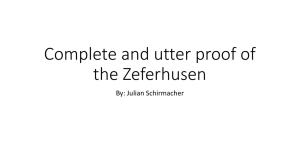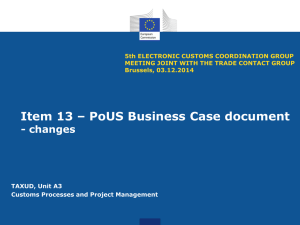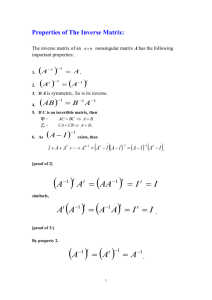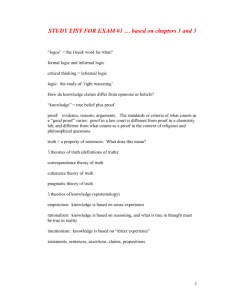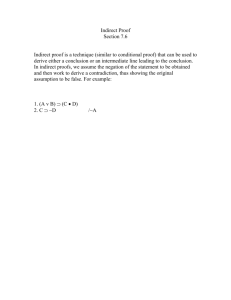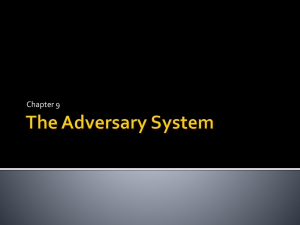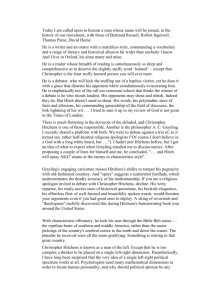Edward Fitzgerald TOK Essay Second Draft
advertisement
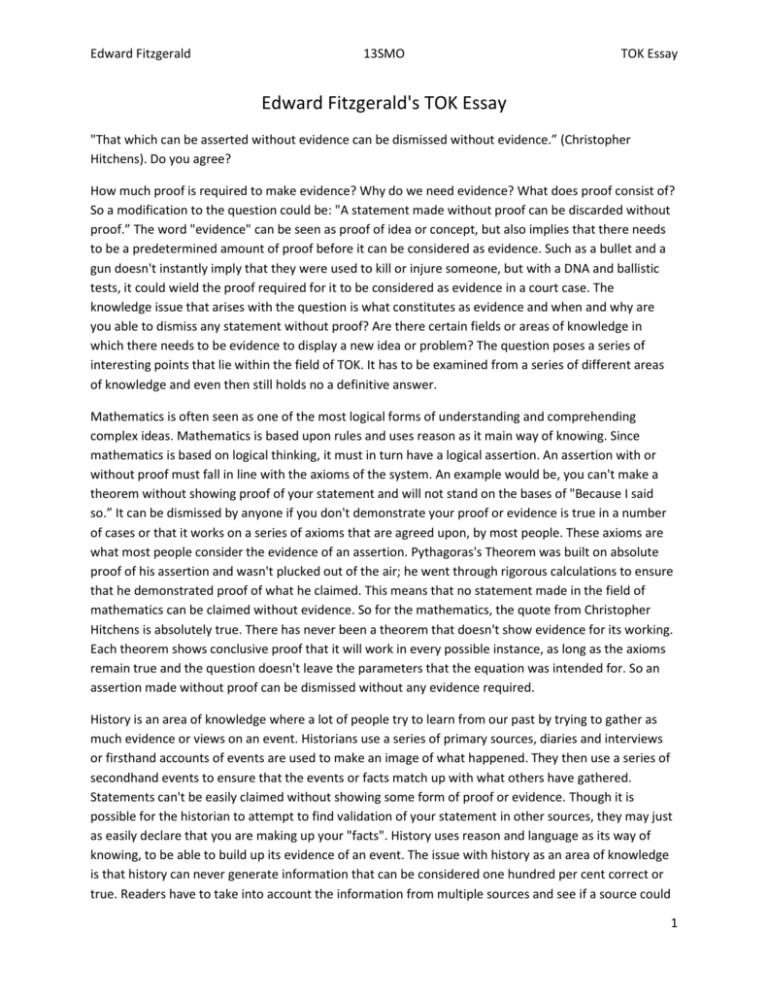
Edward Fitzgerald 13SMO TOK Essay Edward Fitzgerald's TOK Essay "That which can be asserted without evidence can be dismissed without evidence.” (Christopher Hitchens). Do you agree? How much proof is required to make evidence? Why do we need evidence? What does proof consist of? So a modification to the question could be: "A statement made without proof can be discarded without proof.” The word "evidence" can be seen as proof of idea or concept, but also implies that there needs to be a predetermined amount of proof before it can be considered as evidence. Such as a bullet and a gun doesn't instantly imply that they were used to kill or injure someone, but with a DNA and ballistic tests, it could wield the proof required for it to be considered as evidence in a court case. The knowledge issue that arises with the question is what constitutes as evidence and when and why are you able to dismiss any statement without proof? Are there certain fields or areas of knowledge in which there needs to be evidence to display a new idea or problem? The question poses a series of interesting points that lie within the field of TOK. It has to be examined from a series of different areas of knowledge and even then still holds no a definitive answer. Mathematics is often seen as one of the most logical forms of understanding and comprehending complex ideas. Mathematics is based upon rules and uses reason as it main way of knowing. Since mathematics is based on logical thinking, it must in turn have a logical assertion. An assertion with or without proof must fall in line with the axioms of the system. An example would be, you can't make a theorem without showing proof of your statement and will not stand on the bases of "Because I said so.” It can be dismissed by anyone if you don't demonstrate your proof or evidence is true in a number of cases or that it works on a series of axioms that are agreed upon, by most people. These axioms are what most people consider the evidence of an assertion. Pythagoras's Theorem was built on absolute proof of his assertion and wasn't plucked out of the air; he went through rigorous calculations to ensure that he demonstrated proof of what he claimed. This means that no statement made in the field of mathematics can be claimed without evidence. So for the mathematics, the quote from Christopher Hitchens is absolutely true. There has never been a theorem that doesn't show evidence for its working. Each theorem shows conclusive proof that it will work in every possible instance, as long as the axioms remain true and the question doesn't leave the parameters that the equation was intended for. So an assertion made without proof can be dismissed without any evidence required. History is an area of knowledge where a lot of people try to learn from our past by trying to gather as much evidence or views on an event. Historians use a series of primary sources, diaries and interviews or firsthand accounts of events are used to make an image of what happened. They then use a series of secondhand events to ensure that the events or facts match up with what others have gathered. Statements can't be easily claimed without showing some form of proof or evidence. Though it is possible for the historian to attempt to find validation of your statement in other sources, they may just as easily declare that you are making up your "facts". History uses reason and language as its way of knowing, to be able to build up its evidence of an event. The issue with history as an area of knowledge is that history can never generate information that can be considered one hundred per cent correct or true. Readers have to take into account the information from multiple sources and see if a source could 1 Edward Fitzgerald 13SMO TOK Essay be bias or hold prejudices and then have sources that are both objective and subjective. Personally, I had to write an essay for history, of which I study as a subject, and had to write on my birth place of El Salvador. My family moved a lot and that meant that I don't remember living in El Salvador as a child. There was a civil war during the 1980s until half way through the 1990s. Since I wasn't even born during the time of the events, I had to gather information from newspapers, locals, military forces and books. An image was formed by my interviews and the information I gathered, yet none of the information would be considered correct if I didn't look at events from more than one perspective. Gathering proof of an event from multiple perspectives of individuals is called critical analysis. I gathered evidence of events and when they occurred and then worked on the information I acquired. If someone said something in an interview, I would have to return and check that the information they said was correct and could be validated because, at times, it was vague or they would get details incorrect. Though these individuals made some remarks that didn't have any proof, other then what they claimed, I still had to ensure that they were right or wrong and that they had information to back a point up. So, evidence of an event, person or place is gathered from more than one source, so for example in this instance, an assertion made without evidence or any substantial evidence would need to be verified before it can be disclosed as false, invalid or incorrect. This means that Christopher Hitchens would be wrong when it comes to the field of history because firsthand accounts have to be considered correct until they are seen as false or made up when evidence to claim otherwise. So when history as a area of knowledge is considered, I would disagree with the quote. Religion will be the final area of knowledge that will be taken into consideration. Religion isn't based on what most people consider "hard" facts or show explicit evidence to its beliefs, religion is based on faith. Religions are often adaptable, meaning when a section of the religion is proven wrong; people will simply adapt their beliefs and attempt to move any conflicts out of their religion. Evidence can be used to disprove ideas or parts of the religion. The problem arises that since regardless of the proof used, people will maintain their faith in the religion. This means that no amounts of proof can be given to a religious person without them adapting their faith and religion to accept a certain fact. For example, the idea of evolution was pitched by Charles Darwin and many Christians refused to accept the idea since it meant not believing in Adam and Eve being the first people on Earth and who lived, eventually thrown out of, the Garden of Eden. As more proof and evidence was shown, many people finally adapted their beliefs and taking into account science as well. Those who challenge a religion are often met with an "Ad Ignorantiam", which basically means that because someone can't prove it to be false, that it is true. This is where fallacies are created but can't be proven wrong. This means that if a person such as an atheist wished to "prove" God didn't exists, they would have to cancel out every possible dimension, universe or space, to ensure that God didn't exist. This would be impossible, so it would be impossible to disprove the existence of God. So if a new religion were to arise, as long as it still possesses the spiritual level to it, then it would be impossible to disprove. This stands true when the religion known as "Heaven's Gate" which was a religion based on the belief that they must commit suicide to be able to reach the "Next Level" of life. This could be absolutely made up by an individual, but like other religions, no amount of evidence would be able to disprove it. The thing about smaller religions and cult religions is that no one claims they need evidence to actually dismiss them. Many people simply claim that they are made up beliefs by people and disregard them, and yet have no evidence that says they are wrong, so disregard 2 Edward Fitzgerald 13SMO TOK Essay them without evidence. Since most of our ethical beliefs develop from our culture and religion, no one can "prove" to another person that what they do is "correct" while saying to the other, that they are "wrong". So for religion, the quote from Christopher Hitchens doesn't seem to apply since faith is hard to show evidence against the existence of another form of life or disprove the existence of God. The quote from Christopher Hitchens has certain situations in which it is applicable and others, like history and religion, were it doesn't. It seems to work with areas of knowledge that use sense perception, language and reason as their ways of knowing. Christopher Hitchens being a antitheism (atheist), was probably directing his comment at religion, of who he is a common critic of, and saying that since there is no proof for religion, then it doesn't need evidence to be dismissed. Since the quote doesn't always apply to other areas, I don't agree with it or why it should only apply to religion. So, personally I don't agree with the quote by Christopher Hitchens since it can be falsified. Word Count: 1,564 words 3

